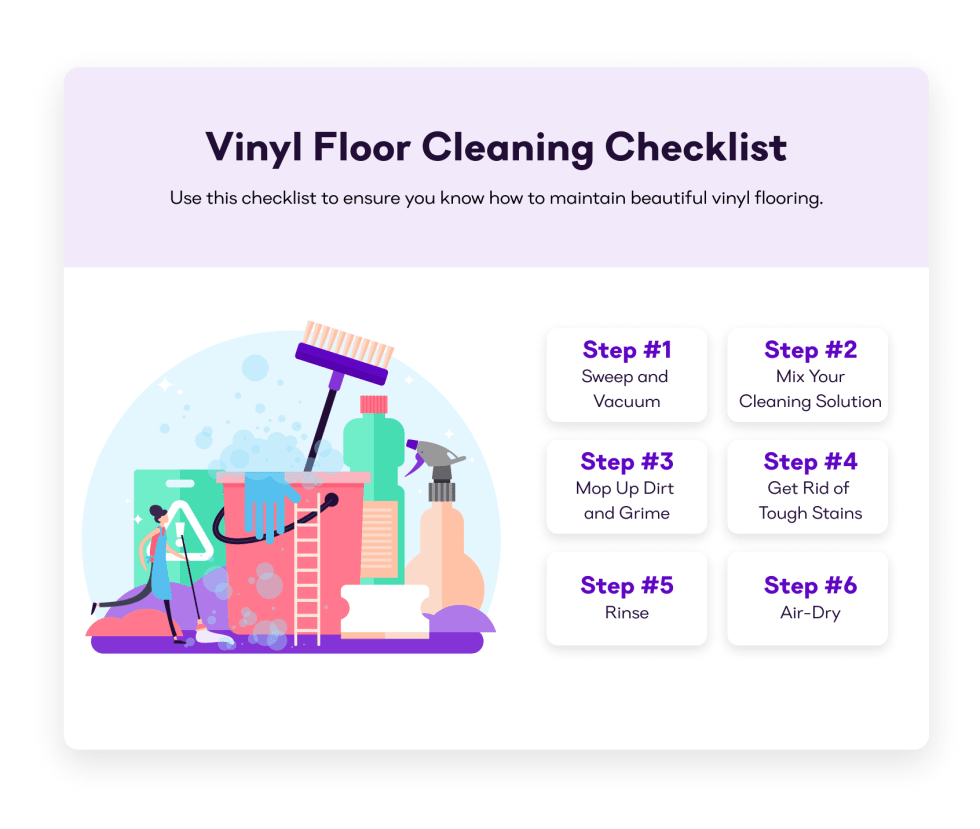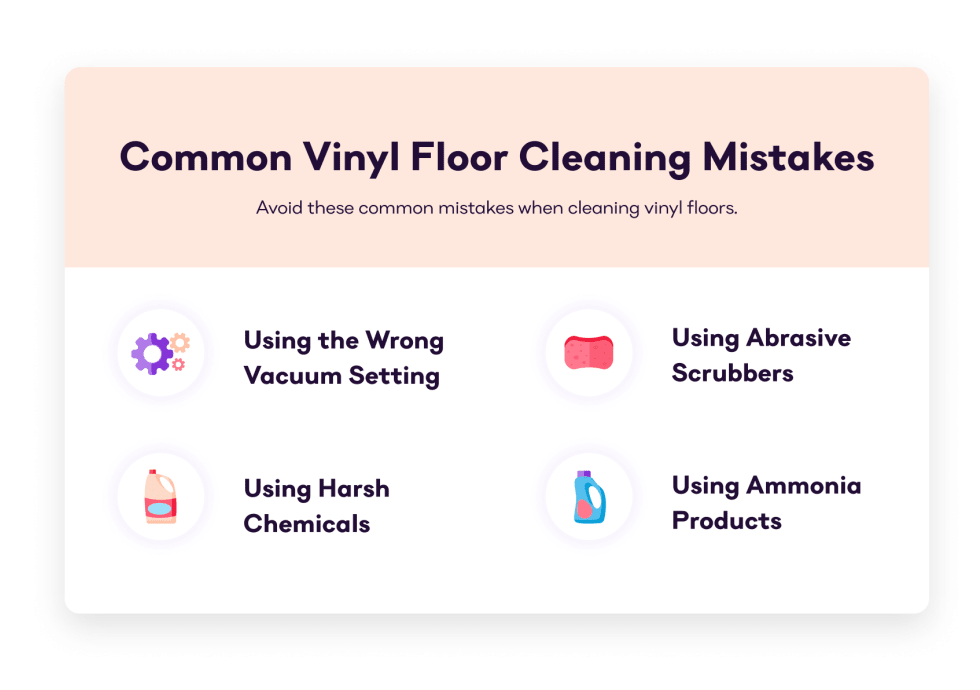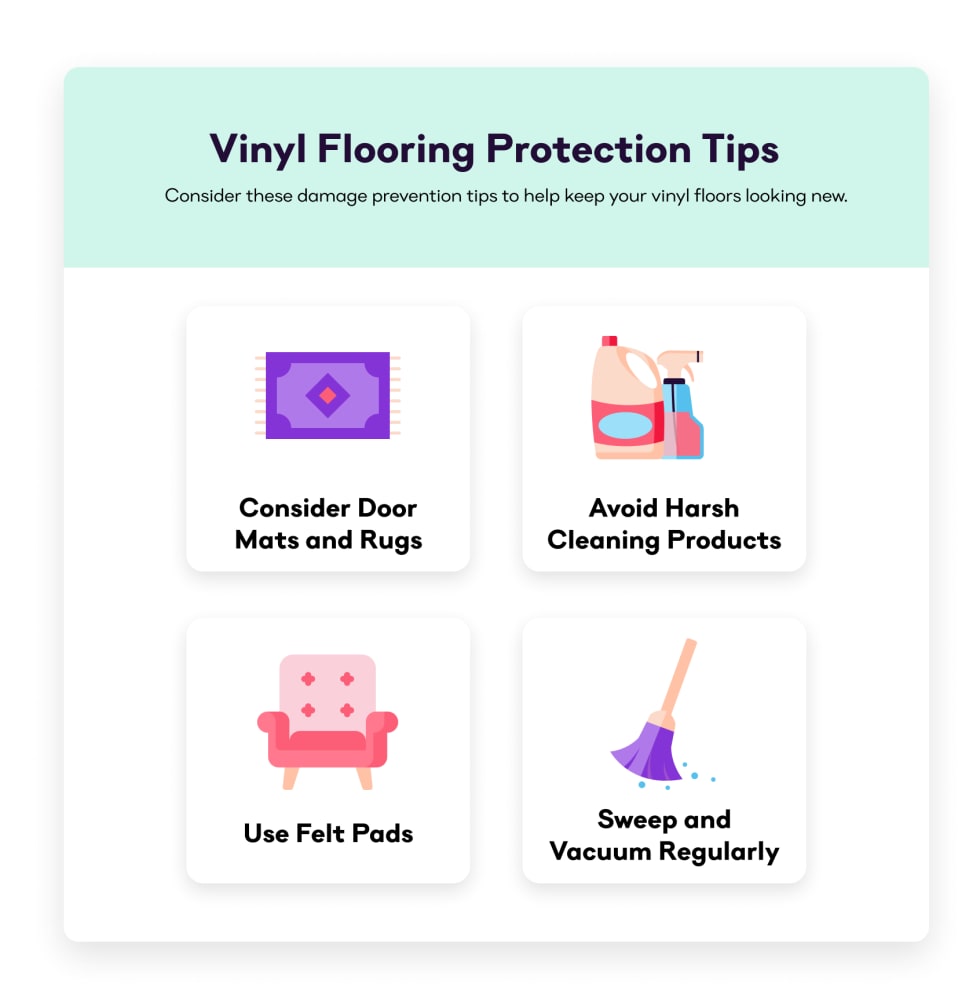- 47 units available
- 1 bed • 2 bed • 3 bed
- Amenities
In unit laundry, Hardwood floors, Dishwasher, 24hr maintenance, Stainless steel, Walk in closets + more

Do your vinyl floors look dull and dirty, no matter how often you try to clean them? If so, let us provide you with our expert advice and tips on how to give your vinyl floors a deep, refreshing clean. No matter which type of vinyl flooring you have – sheet vinyl, luxury plank flooring, vinyl plank flooring, or vinyl tile flooring– this guide will provide simple and effective recommendations on how to clean vinyl floors effectively. Additionally, we'll provide 8 tips that can help protect your flooring from stains, scuffs, water damage, and more.
Let's dive in!

There is no need to spend money on the best cleaner for vinyl plank floors. With just a few basic cleaning supplies, you can create your own vinyl floor cleaner and effectively keep your vinyl planks looking like new.
For a straightforward clean without any major stains, you will want to gather the following:
After gathering these supplies, follow the steps below to learn the best way to clean vinyl plank floors.
Vacuuming vinyl plank flooring is an effective way to remove dirt and dust, as the suction power effectively lifts particles that may be trapped in the texture of the planks. Sweeping vinyl plank flooring is also beneficial, as soft bristles gently loosen dirt stuck in between planks or in the crevices.
A simple water and dishwashing soap combination is the best cleaner for vinyl floors. Fill your bucket with warm water and add about 1 tablespoon of liquid dishwashing soap for every 2 cups of water. It is best to add the soap while the water is still dispensing into your bucket so the water and soap mix properly.
Dip a soft mop into the mopping solution you mixed, wring out any excess water, and start mopping the floor. It is best to work in small sections, rinsing the mop often. Avoid using too much water when mopping, as this can seep into the seams between the planks and cause damage.
Getting rid of tough stains on vinyl plank flooring can be a challenge, but with the right approach, it is possible to remove many types of stains. Depending on the stain there are different solutions to remove some common stains.
Remember to always spot-test the cleaning solution in an inconspicuous area before applying it to a larger surface to make sure it does not damage the flooring.
Blot up as much of the stain as possible with a clean cloth. Then, use a mixture of warm water and mild soap to clean the area, using a soft cloth or mop. For stubborn food stains, try a cleaner specifically designed for removing food stains on vinyl flooring.
For scuff marks, try using a soft-bristled brush to gently scrub the affected area. Alternatively, you can use a magic eraser or a cleaner specifically designed for removing scuff marks on vinyl flooring.
To remove grease, lipstick, or ink stains, use a cleaner specifically designed for removing these types of stains on vinyl flooring. If a commercial cleaner is not available, try using rubbing alcohol or a mixture of baking soda and water. Apply the cleaner to a cloth and gently rub the stain until it is removed, taking care not to scrub too hard and damage the surface of the vinyl.
Remember to always spot-test the cleaning solution in an inconspicuous area before applying it to a larger surface to make sure it does not damage the flooring.
After mopping your vinyl plank flooring, it's important to rinse the floor thoroughly to remove any soap residue and prevent a dulling film from forming.
Vinyl Floor Cleaning Tip: Add a few drops of baby oil to your water solution to get your vinyl floors to shine.
After rinsing vinyl plank flooring, it's important to let it air dry completely to prevent water damage or warping. Do not use towels or other cloths to speed up the drying process, as this can leave lint or streaks on the surface of the vinyl. Instead, simply open windows and doors or turn on fans to increase airflow and allow the floor to dry completely on its own.

When cleaning vinyl floors, it’s important to avoid certain damaging or longevity-reducing practices. With a bit of mindfulness, you can avoid being charged for damage to your vinyl flooring.
While cleaning vinyl plank flooring is simple, follow those tips to avoid damage to your vinyl floors. Whether you are spring cleaning your apartment or doing a quick weekly clean, there are many ways to make your vinyl floors shine without damaging them.

To help prevent damage to vinyl flooring, it's important to follow proper maintenance and cleaning procedures. Here are a few preventative damage tips:
Cleaning and protecting your vinyl flooring may seem like a daunting task, but with the right supplies and knowledge, it can be easily done. With our simple guide on how to clean vinyl floors, you'll have no trouble keeping your floors looking like new for years to come. And if you're in search of a new apartment to call home, head to Apartment List to check out our robust catalog of listings, many of which offer vinyl floor options for you to pick from.

You should not clean vinyl plank flooring with:
This can help avoid discoloration, scratches, or warping. Instead, use a mild mopping solution and a soft mop for regular cleaning.
You should clean your vinyl flooring on a weekly or bi-weekly basis, depending on the level of foot traffic in the home.
Yes, you can mop vinyl flooring, though you will want to work in small sections, as this allows you to keep the mop clean by rinsing it often. Avoid using too much water while you are mopping your vinyl plank flooring, as it can seep into the seams between the planks and cause damage.


In unit laundry, Hardwood floors, Dishwasher, 24hr maintenance, Stainless steel, Walk in closets + more
In unit laundry, Granite counters, Pet friendly, Stainless steel, Walk in closets, Gym + more